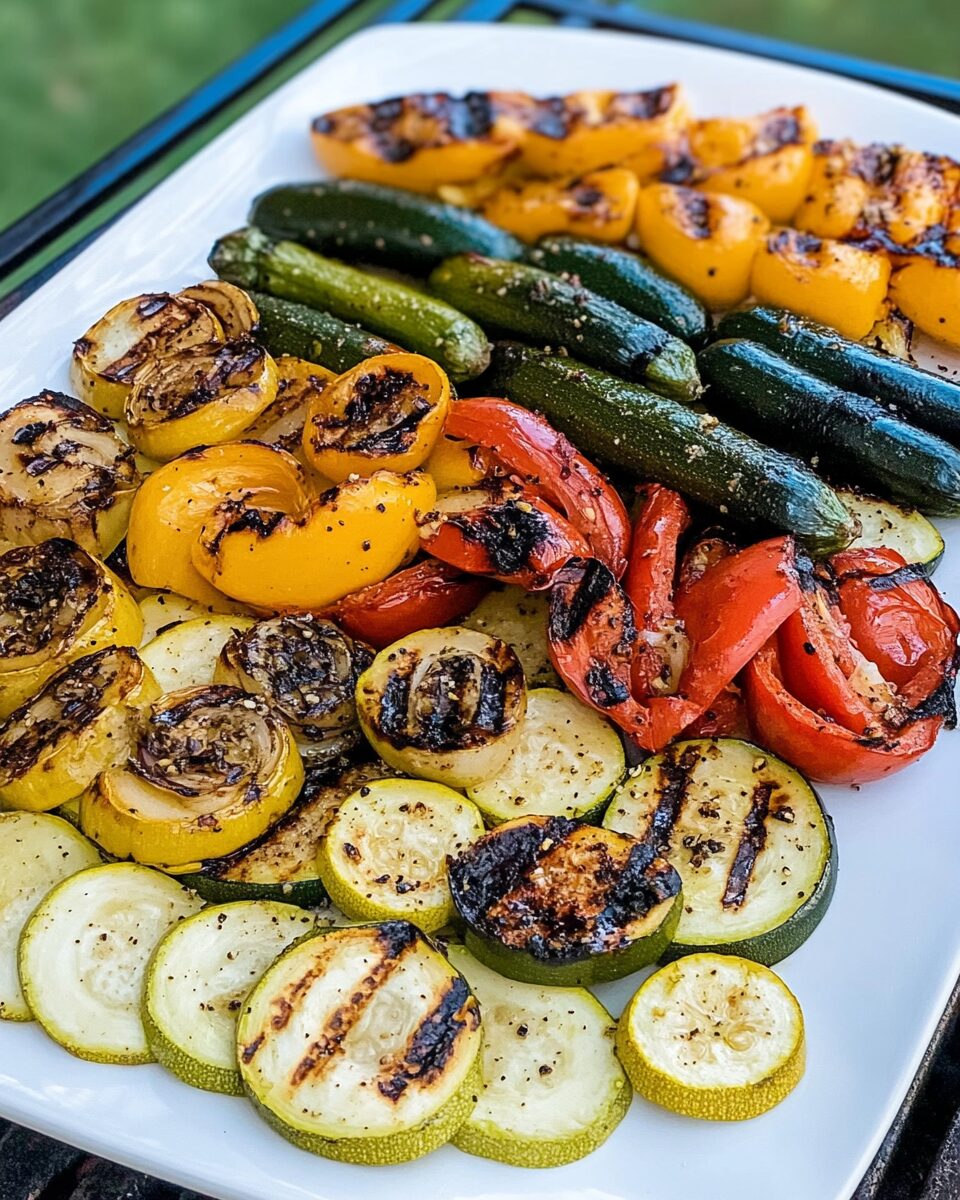A light and flavorful side dish, these grilled vegetables are marinated in zesty lemon juice and rich olive oil, then perfectly charred for a smoky finish. They pair beautifully with grilled meats, seafood, or can be enjoyed on their own for a healthy, plant-based option.
FULL RECIPE
Ingredients
- 1 zucchini, sliced into 1/4-inch rounds
- 1 yellow squash, sliced into 1/4-inch rounds
- 1 red bell pepper, sliced into strips
- 1 yellow bell pepper, sliced into strips
- 1 red onion, cut into thick wedges
- 8 oz cremini mushrooms, halved
- 3 tbsp olive oil
- 2 tbsp fresh lemon juice
- 1 tsp dried oregano
- Salt, to taste
- Black pepper, to taste
Directions
- Preheat the grill to medium-high heat.
- In a large mixing bowl, combine olive oil, lemon juice, oregano, salt, and black pepper.
- Add the vegetables to the bowl and toss to coat evenly with the marinade.
- Let the vegetables marinate for 10–15 minutes while the grill heats.
- Place the vegetables directly on the grill grates or use a grill basket.
- Grill for 4–6 minutes per side, turning occasionally, until tender and slightly charred.
- Remove from grill and serve immediately.
Nutritional Information
- Calories: 120 per serving
- Protein: 2g
- Fat: 9g
- Carbohydrates: 10g
- Fiber: 3g
- Sugars: 5g
- Sodium: 100mg
Health Benefits of Grilled Vegetables
Grilled vegetables provide a nutritious addition to any meal, offering an array of vitamins, minerals, and antioxidants. The grilling process helps retain many of the nutrients that can be lost with boiling or frying. Vegetables like zucchini, bell peppers, and mushrooms are low in calories but high in fiber, supporting digestive health and helping maintain a healthy weight. The olive oil used in the recipe adds heart-healthy monounsaturated fats, which can help reduce bad cholesterol levels.
The Role of Olive Oil in Flavor and Nutrition
Olive oil not only enhances the taste of grilled vegetables but also brings significant health benefits. It contains antioxidants and anti-inflammatory properties that contribute to cardiovascular health. When combined with lemon juice, olive oil helps balance the richness with a fresh, zesty note, making the vegetables more palatable and vibrant.
Why Lemon Juice Works Perfectly
Lemon juice adds brightness and acidity that complements the smoky flavors developed during grilling. Its natural citric acid helps tenderize the vegetables slightly, allowing them to absorb more flavors from the marinade. It also provides vitamin C, which supports the immune system and aids in iron absorption from plant-based foods.
Grilling Techniques for Optimal Flavor
Grilling vegetables requires attention to temperature and timing. Medium-high heat is ideal for achieving a charred exterior while keeping the inside tender. Using a grill basket can prevent smaller pieces from falling through the grates. Rotating the vegetables ensures even cooking and prevents burning, helping retain their natural sweetness.
Choosing the Best Vegetables for Grilling
Vegetables that are firm and not too watery hold up well on the grill. Zucchini, squash, bell peppers, onions, and mushrooms are excellent choices because they cook evenly and develop rich, smoky flavors. Selecting fresh, seasonal vegetables enhances the dish’s overall taste and texture.
The Importance of Marinating
Marinating vegetables before grilling infuses them with flavor and helps maintain moisture during cooking. The lemon and olive oil marinade in this recipe prevents drying out and adds complexity to the simple grilled vegetables. Marinating for 10 to 15 minutes is usually sufficient to achieve good flavor penetration without overwhelming the natural taste of the vegetables.
Grilled Vegetables as a Versatile Side Dish
This grilled vegetable recipe pairs well with a variety of main dishes. It can accompany grilled meats like steak or chicken, seafood such as salmon or shrimp, or be part of a vegetarian meal. Its versatility makes it a great addition to summer barbecues, family dinners, or casual get-togethers.
Serving Suggestions and Presentation
To enhance the dish visually and flavor-wise, grilled vegetables can be garnished with fresh herbs like parsley, basil, or thyme. A sprinkle of crumbled feta or a drizzle of balsamic glaze can add extra dimension. Serving the vegetables warm ensures they retain their appealing texture and smoky aroma.
Tips for Storing and Reheating
Leftover grilled vegetables can be stored in an airtight container in the refrigerator for up to three days. To reheat, warming them in a skillet or briefly under the broiler helps maintain their texture better than microwaving. They can also be enjoyed cold in salads or wraps, making them a convenient option for meal prep.
Dietary Considerations
This recipe is naturally gluten-free, vegan, and low in calories, making it suitable for many dietary preferences and restrictions. It’s also high in fiber, which supports digestive health, and contains no added sugars or processed ingredients, making it a clean eating choice.
The Science Behind Grilling Vegetables
Grilling causes Maillard reactions and caramelization, which develop complex flavors and appealing textures. The sugars in vegetables caramelize, creating a subtle sweetness, while the dry heat helps evaporate excess moisture. This process transforms simple vegetables into a flavorful dish without needing heavy sauces or seasonings.
Comparing Grilling to Other Cooking Methods
Grilling is often preferred over boiling or frying because it uses less oil and retains more nutrients. Unlike frying, grilling doesn’t add extra calories from breading or deep-frying oils. Compared to roasting, grilling typically cooks faster and imparts a distinctive smoky flavor that can’t be replicated in an oven.
Environmental Impact of Grilling Vegetables
Using vegetables as a primary dish or side can reduce the carbon footprint of meals compared to meat-heavy diets. Grilling vegetables on a gas or charcoal grill is also energy-efficient when done mindfully, especially if using sustainable fuel sources or electric grills powered by renewable energy.
Cultural Significance of Grilled Vegetables
Grilled vegetables feature prominently in Mediterranean, Middle Eastern, and Latin American cuisines, where fresh produce and simple preparations are celebrated. This recipe reflects those culinary traditions by highlighting the natural flavors of the vegetables with minimal ingredients.
Pairing Grilled Vegetables with Wines
Light, crisp white wines like Sauvignon Blanc or a dry rosé complement the bright and smoky flavors of grilled vegetables. For a non-alcoholic option, sparkling water with a splash of citrus can refresh the palate between bites.
Adjusting the Recipe for Larger Groups
This recipe scales easily for parties or family gatherings. Simply increase the quantity of vegetables and marinade proportionally. Grilling in batches or using multiple grill surfaces can help accommodate more servings without sacrificing quality.
Incorporating Grilled Vegetables into Meal Prep
Grilled vegetables are excellent for meal prepping because they store well and reheat easily. They can be used in grain bowls, pasta dishes, sandwiches, or salads throughout the week, adding flavor and nutrition to quick meals.
Enhancing Flavor with Additional Herbs and Spices
While oregano works well in this recipe, other herbs like rosemary, thyme, or smoked paprika can be experimented with for variety. Adding minced garlic or chili flakes to the marinade can introduce new layers of flavor, adjusting the dish to personal taste preferences.
Balancing Texture and Color
Grilling a variety of vegetables ensures a balance of textures, from the crispness of peppers to the softness of mushrooms. Including different colors also makes the dish more visually appealing and nutritionally diverse, as pigments often correlate with specific antioxidants.
Safety Tips for Grilling Vegetables
Ensure vegetables are cut into similar sizes for even cooking and avoid cross-contamination by keeping raw vegetables separate from raw meats on the grill. Cleaning the grill grates before use helps prevent sticking and reduces flare-ups caused by leftover grease.
Conclusion
Grilled vegetables with lemon and olive oil are a simple yet flavorful dish that highlights the natural goodness of fresh produce. The combination of smoky char, zesty lemon, and smooth olive oil creates a harmonious balance perfect for any meal. This recipe offers flexibility, nutritional benefits, and ease of preparation, making it a reliable choice for healthy, delicious dining. Whether served as a side or incorporated into larger dishes, these grilled vegetables enhance the table with color, texture, and vibrant taste.





